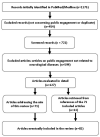Public Engagement and Neurology: An Update
- PMID: 33800571
- PMCID: PMC8065487
- DOI: 10.3390/brainsci11040429
Public Engagement and Neurology: An Update
Abstract
Background: Public engagement (PE) is defined as the involvement of "specialists who listen, develop their understanding, and interact with non-specialists in non-profit activities of educational, cultural, and social nature to engage the public in science-related matters". The public health relevance of PE consists in building up a scientifically literate society, able to participate in and support scientific and technological developments and their implications for educational settings. Neurological disorders account for 35% of all diseases. PE could have a positive impact on the lives of people affected by neurological diseases.
Method: This review evaluates the role of PE in dementia, stroke, epilepsy, multiple sclerosis, Parkinson's disease, migraine, neurogenetics, and amyotrophic lateral sclerosis.
Results and conclusions: PE can provide accessible information, support research activities and prevention through appropriate lifestyles, and increase knowledge and awareness of neurological disorders, improving their diagnosis and treatment.
Keywords: association; awareness; campaign; educational; foundation; fundraising; prevention; public engagement.
Conflict of interest statement
The authors declare no conflict of interest.
References
-
- [(accessed on 26 March 2021)]; Available online: https://www.anvur.it/en/activities/third-mission-impact/
-
- [(accessed on 26 March 2021)]; Available online: https://ec.europa.eu/programmes/horizon2020/en/h2020-section/public-enga....
-
- [(accessed on 26 March 2021)]; Available online: https://www.euro.who.int/en/data-and-evidence/news/news/2016/09/what-is-....
-
- [(accessed on 26 March 2021)]; Available online: https://www.multiact.eu/
Publication types
LinkOut - more resources
Full Text Sources
Other Literature Sources


